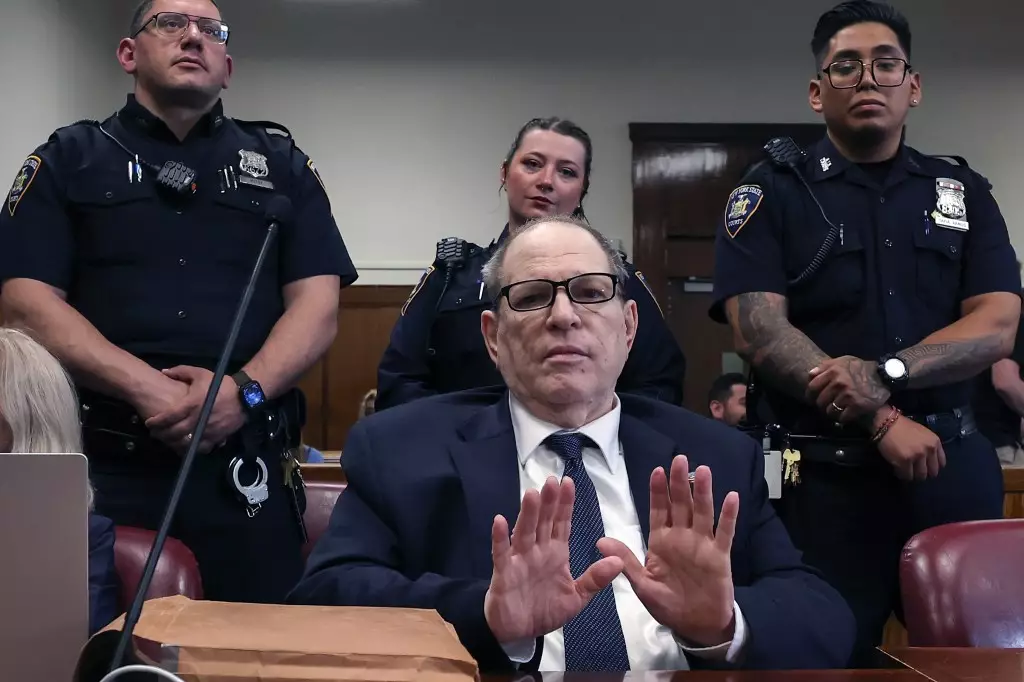In the labyrinth of the legal system, decisions can often reflect the broader implications of a trial. Harvey Weinstein, once the titan of Hollywood, who wielded power with an iron fist, has now become an emblem of the industry’s dark underbelly. His choice to remain silent during his New York rape retrial raises a question: is this tactical prudence or an evasion of accountability? With his defense counsel publicly expressing worries over his health and the potential repercussions of testimony, it seems the courtroom has become a stage for a far more profound struggle than just legal tactics; it’s a battle over reputation and legacy.
Weinstein’s spokesperson, Juda Engelmayer, remarked on his client’s instinct to testify, emphasizing that their decision is one rooted in “caution.” However, caution can often masquerade as cowardice, especially for a man whose actions have left an indelible mark on countless lives. By choosing not to speak, Weinstein arguably avoids the potential scrutiny of his character and past behaviors, opting instead to let his lawyers handle the narrative—the very narrative that has painted him as a predator.
The Hypocrisy of Public Relations
Weinstein’s calculated public relations maneuvers, such as his jailhouse interview with right-wing commentator Candace Owens, illuminate the absurd lengths to which he will go to cling to a sense of innocence. During this interview, he professed, “I did not commit these crimes” and positioned himself as a martyr of sorts, a victim of public opinion rather than a perpetrator of heinous acts. This strategy echoes the archaic notions of “men’s rights” that have resurfaced in the wake of the #MeToo movement, where victims are frequently vilified, and perpetrators find refuge in rhetoric that prioritizes their stories over those whose lives they’ve shattered.
It’s almost bizarre how Weinstein attempts to manipulate the dialogue surrounding moral versus illegal actions, as though the two could be delineated in a court of law. This approach not only undermines the gravity of the accusations against him; it reveals a profound misunderstanding—or willful ignorance—of why the public reacted so sharply to his actions.
The Damning Influence of High-Powered Defense Strategies
With an impressive roster of legal talents like Arthur Aidala at his side, Weinstein is embracing a defense that challenges the legitimacy of victim testimony by framing it as “mutual and consensual.” This redirection is an attempt to reestablish agency—an agency that Weinstein routinely stripped from his victims during his time of power. This assertion of “friendship with benefits” is not only an insult to those who courageously stepped forward but also a striking reminder of how language can be wielded as a weapon, twisting the narrative to serve those who have historically exploited it.
Especially concerning is the potential political leverage in the courtroom: a new judge and a shifted indictment could all play into the hands of someone who knows the political landscape all too well. The implications of recent modifications in his legal representation and the added charges may shift public perception surprisingly, yet one cannot help but wonder if this potential for leniency is just another chapter in a story filled with privilege and connections.
The Broader Implications for Justice
As the jury deliberates, the outcome of Weinstein’s retrial could resonate far beyond the confines of this particular case. In a world where the voices of survivors are often drowned out by those with resources and power, the ramifications could serve as either a stark reminder or a painful reinforcement of systemic injustices. Will Weinstein’s silence lead to a triumph for the privileged, or will it serve as a proverbial nail in the coffin of the Hollywood elite who have perpetuated a culture of silence and complicity?
For many, this trial is not just about one man; it embodies a societal reckoning. It forces a reckoning of the structures that have long protected the abusers while vilifying the brave souls who dare to speak out. Ultimately, as Weinstein remains behind closed doors, the world watches, hoping for justice and redemption—not just for one but for many. The implications are profound, and one can only hope that whatever verdict is reached serves as a milestone in the continuous fight for accountability.



Leave a Reply